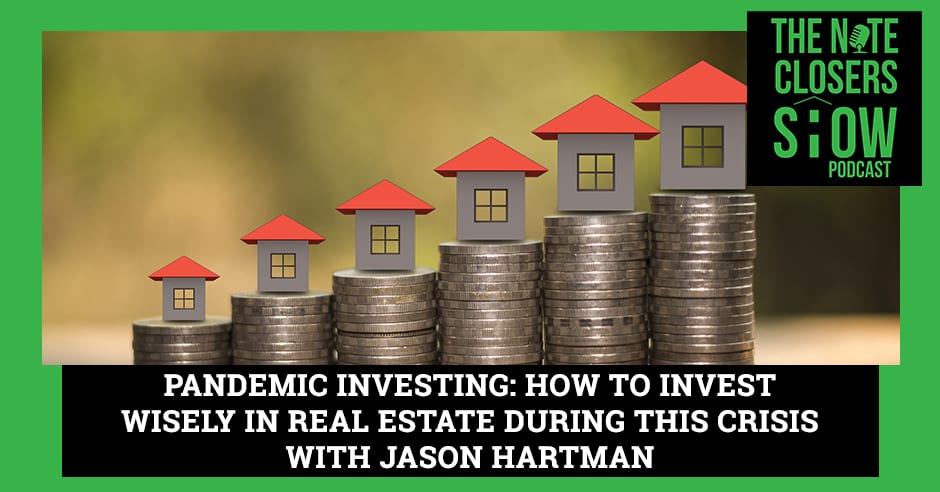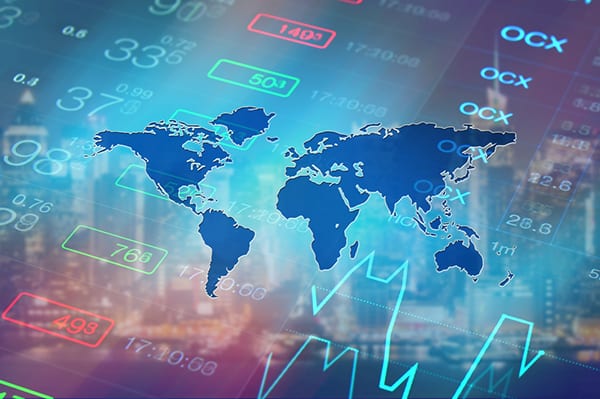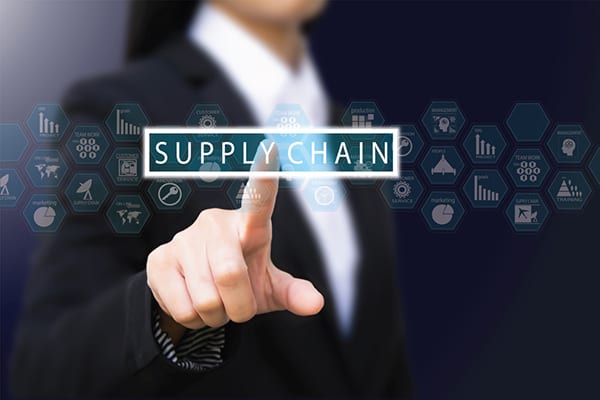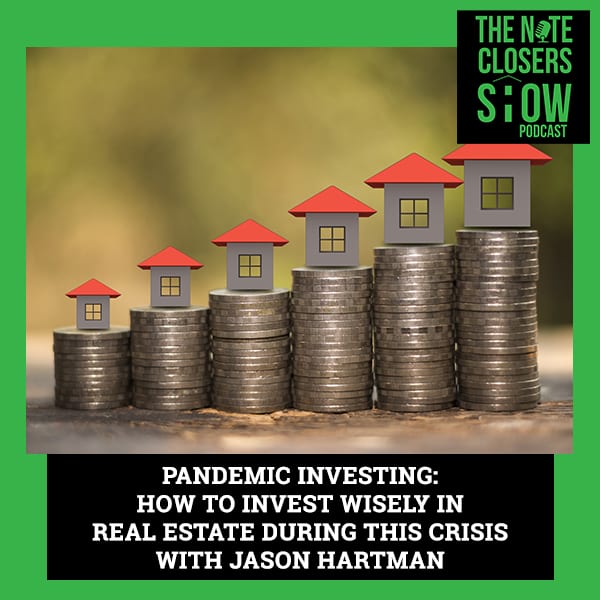
There is a lot of anxiety in the market right now, especially when it comes to putting your cash in the right box. Pandemic investing is a necessary skill that entrepreneurs and real estate investors need to prioritize today. In this episode, Scott Carson talks with real estate investor Jason Hartman about the future of their industry, highlighting the repercussions of the coronavirus. Jason is the Founder of Platinum Properties Investor Network and the host of the Creating Wealth Show. With his business scope, he gives his prediction on what segments will be popular and which areas you should invest in. He also talks about some good things that developed for the domestic economy, such as bringing more jobs back to America.
—
Watch the episode here
Listen to the podcast here
Pandemic Investing: How To Invest Wisely In Real Estate During This Crisis With Jason Hartman
We live in some strange times. We can all agree that the world is a different place than it was a week ago. We’re excited about this episode and I’ve got a guy on here that I’ve looked up to for quite a while. You may not know that, but I’ve looked up to him and considered him the premier real estate educator and investor out there who’s helped many people. This guy is a freaking beast when it comes to working with other investors. He’s the Founder of Platinum Properties Investor Network and the host of the Creating Wealth Podcast, plus about another 22 other podcasts to go along. He’s got listeners in 180 countries. He’s a genuine, self-made multimillionaire and serial entrepreneur who owns 21 businesses, and investing in financing real estate development and SaaS software. He has owned properties in eleven states and hundreds of thousands of tenants and been involved in several thousand real estate transactions. He’s also an avid world traveler to 83 countries, enjoys adventure, fitness and lifelong learning and hanging out with his best friend, Coco, the dog who comes along with him a lot of times. We’re honored to have Jason Hartman join us on the show.
It’s great to be here. We are living in some scary times and I want to talk about that. You said the world is different and it’s radically different than it was weeks ago. It is amazing how quickly the pandemic has come upon us. The background on your green screen with Mars is perfect. I bet the virus isn’t living there and everybody’s trying to get away from this and you can’t blame them. These are scary times. The question is, “How do we invest in this? How do we play it from a personal financial standpoint?” People are scared about getting sick, but most people have taken steps to deal with that. The problem is they don’t know what steps to take as far as money. Let’s see if we can dive into some of that stuff.
You’ve got a presentation. For our audience, you may want to jump over to our YouTube channel to go through the slides. Jason does a great job presenting. If you want to take some notes to pull up the actual slides, go over to our YouTube channel. You can access all our videos at WeCloseNotes.tv, it will take you directly there. Pandemic investing, there is a lot of nervousness in the market. I’ve talked to a lot of buyers and our investors are like, “Where do we go? What do we do? How do we pivot?” We’re all on pins and needles.
There should be a lot of concern because there’s a lot of reason to be concerned. This is a total black swan. We knew this would happen someday. We knew that there would be a virus, a disease, a pandemic. Throughout history, this stuff has happened. The last big one was the Spanish flu in 1918 over 100 years ago. It’s strangely called the Spanish flu. The thinking is it probably started in the Kansas City area. I don’t know how it got that name. I can’t remember. I did know but I forgot. Let’s talk about some of the macro aspects. This is big picture stuff. I don’t have any stock tips. I don’t have any super specific stuff, but you’ve got to start with the big macro picture and go from there. Let’s dive into that macro picture on pandemic investing.
First off, I’d like to say that most of your audience understands the concept of monetary policy and fiscal policy and how it affects the three basic economic situations: inflation, deflation and stagnation. We are in an era of unprecedented money creation. A few years ago, we had the great recession and everybody thought the amount of money we’re creating is crazy with these trillion-dollar bailouts. It was socialism for big, giant, rich companies. People were upset about it and rightfully so. Should we bail out Bear Stearns and Lehman Brothers? We know what happened there. We did and we didn’t, depending on the company.
The amount of money creation we are going to see this time around is going to dwarf anything in the past. We’re about to witness the biggest money printing extravaganza in world history and it’s going to be insane what we’ll see. I call it Stimulus Maximus. This is quantitative easing like we’ve probably never seen before. It’s going to dwarf everything else. The airlines want $50 billion. Mitt Romney was saying $1,000 checks for everybody. That was already increased by 20% and it looks like that number is going to be $1,200 per person. That’s only going to tide people over. If you talk about low wage people, that’s about three weeks. You’ve got to have another check right after that or they’re going to be defaulting on everything. They’re going to get another check right after that.
This is going to be a prelude to 1 of 2 things. It might be a prelude to a universal basic income. We’ve heard people talking about that and/or it might be a prelude to a national type of Section 8 Housing Assistance Program. It might be both. It might be one or the other. Philosophically, I disagree with both of those ideas, but it doesn’t matter what I think or what you think. The powers that the government has in our lives is not going away. The whole system has been financialized. Financialization is the difference between the Wall Street economy and the Main Street economy, between the real economy and the fake economy.
The system is financialized that there’s much leverage in the system now that you can’t solve these problems in normal ways anymore. You’ve got to have big bailouts. You’ve got to have derivatives. This stuff gets worse and worse. You can’t make it go away. It’s like a virus, pardon the pun. It grows and grows and takes over more cells and that’s the world we’re in. This is probably out of date by the way, because these numbers are three days old. That’s how fast it’s changing. $500 billion per week to the short-term money market, most of that is in the repo market. They have other facilities too. The repo market is the repurchase market that allows the banks to trade short-term capital. Most of your readers are pretty financially savvy and they understand that. If that seizes up, it will be like what they were worried about during the Great Recession and what did happen for part of the Great Recession before the bailouts came.
Spending like this is ultimately inflationary. It has to be. The classic concept of inflation is you have too many dollars, yen, rubles, pesos, euros or whatever the currency is. We’ll talk in dollars, but too many dollars are chasing a limited supply of goods and services, and that creates inflation. This leads to significant inflationary pressure. What people are thinking about is they’re asking, “What is it and how long will it last?” The two elements of it are number one, the actual virus itself, the clinical part and the health concerns. We’re not talking about that now. We’re talking about the second part, which is the economic impact. With that, you can divide it into two parts. The direct part, which is what we see right away or the indirect which is the induced impact.
Most of the world is under self-quarantine. Some are under official ordered quarantine where if you leave, you’ll be arrested or maybe worse than arrested. That quarantine has huge effects. People can’t go to work and auto factories have shut down. This is crazy. This is the fastest shock to the system we have ever seen. It’s nuts, but then after that, comes all the follow-on effects. All of the suppliers that supply to restaurants aren’t getting any orders, suddenly their business has gone. Look at the movie theaters, professional sports, Broadway plays. For any gathering, it’s over, the whole convention industry. We know a lot of the same people in that industry. The event industry, it’s gone. It’s over. Can you believe it?
I heard somewhere that they expect 50% of the events not to ever recover because they didn’t have insurance for this time around. They weren’t set up in the case for mass cancellations or mass refunds and stuff like that. People aren’t prepared. You see some that are using the online. Everybody’s a virtual summit expert, it seems these days. Even what we’re doing now that we’ve been doing for years. It’s a domino effect of businesses, suppliers and employees going out to the providers. It’s almost a death spiral in a lot of cases.
We had two events planned, our annual Meet The Masters of Income Property Conference. That was our 22nd-anniversary event. We announced it and it was about 5 to 7 days later that we canceled it. Because it was so early, our hotel venue tried to collect from us. They say, “You’ve got to pay us.” Their position was it’s legal to have the event. There’s no law saying you can’t have the event. As we were going to argue over the bill, I said, “We want to have the event. We’ll have the event. We just want to postpone it. We’re not backing out of the deal. We’re just postponing the deal.” They said, “You’ve got to pay us the damages fee.” No later than another week goes by, then there is quarantine, an official one. It’s bad. Thankfully, we didn’t have to pay at least not so far, but look at what happens to them. Look at what happens to the audiovisual companies that don’t get an order. It’s the domino that is mind-boggling in an interconnected economy.

Pandemic Investing: Financialization is the difference between the Wall Street economy and the main street economy.
What I want to talk about that’s rare here and different than other recessions. Anybody who says that we might not have a recession or we’re not in a recession is nuts. We’re already in a recession. Get with it. You’re crazy to think otherwise. You cannot shut down the economy of planet Earth and expect not to be in a recession. That’s where we are. The global GDP, the entire economic value of planet Earth is somewhere in the neighborhood of $80 trillion a year. Instantly, we’re going to knock off $20 trillion out of that number and probably a little more. We’ll come back. It’s not the end of the world but it’s certainly a hit. There’s no question about it. Let’s examine what type of hit it is and what you can do about it. This is what’s rare. Usually, when you have a recession, it’s caused by demand shock, meaning that consumers don’t have any money. They don’t want to buy a new house or a new car. They’re not going out to restaurants. They’re pulling in their horns. They’re tightening up their belts and they’re not spending. In the American economy, consumer spending is about 70% of the economy. That’s the typical recession caused by demand shock. The demand tapers off and nobody’s spending.
The famous last words of any investor now are, “This time, it’s different.” I don’t mean it in a typical way that’s used. This time it’s different in the sense that we are not only having a demand shock, we’re also having a supply shock. What does that mean? This started in China. China is the workshop of the world. Almost everything is made in China. In China, all you have to do to know that China’s economy is in hibernation mode and now ours is too. Italy’s, Iran’s and most places of the world is in hibernation. Think of how a bear hibernates, for example. The bear will go to sleep and all of its bodily functions go way down. There’s a heart rate. I remember watching these years ago, the bear’s heart beats a couple of beats per minute instead of 60 beats a minute or something. Don’t quote me on those.
It’s a single beat in ten or less a minute.
It’s very little. It’s just enough to barely keep the organism alive. It’s in hibernation. That’s a fair assessment as to how the economy is now. It’s in hibernation mode. It started in China. The supply shock is that the supplier isn’t making the goods anymore and there’s a huge following on because when you make the base good and the next part of that supply chain can’t get those goods anymore, they can’t do anything. They have no widgets to sell either. If you make auto parts in China for example, and you ship them to the US, there you go. All you have to do to know that China is in hibernation mode is look at the satellite images of the pollution. The air is cleaner than ever. There are some good silver linings and we’re going to get to that. For the environment, maybe this will make us all a little more conscious about it because we see the difference when the economy goes into hibernation and suddenly the air and the water is a lot cleaner.
They’re talking about dolphins and other animals swimming up into Venice, Italy where they hadn’t been before.
The water is clear. When I was in Venice, Italy a few years ago, the you couldn’t see through the water. Now, you can.
It may not stink as bad as it has been noted in the past.
A lot of the nature stinks though. A lot of the fish and the plankton are not too good themselves. In the 1970s, we had a rare supply-demand shock. Some of the people know or remember even the OPEC crisis where we had gas prices rising and people are waiting in line in their cars for three hours to get gas. We had the Jimmy Carter era, which was a poorly managed economy. Something came out of that called The Misery Index. The Misery Index was a situation where you have a bad economy. When you have a bad economy, you have a deflationary pressure where prices come down because nobody’s buying. In that case, you had a rare instance where you had a bad economy, high unemployment, wage is stagnant, but the price is rising at the same time. That’s what we are probably coming into, a stagnation type of economy.
If you don’t have supply, you’re going to have upward pressure on prices. If you have tons of money printing, you’re going to have upward pressure on prices. You have a situation where people aren’t working or not working as much. We’ll see how it all plays out. The interesting thing too is this is by choice. This is a self-imposed recession. Usually, they’re not self-imposed. Moving on here, social distance. This is a new phrase we’ve all become familiar with. Stay away, don’t shake hands and don’t sneeze. You’ve got to be 6 feet away from everybody nowadays. That’s a new thing.
This leads to an opportunity. Home has become the center of the universe. Commercial properties are in trouble because we’ve already seen for the past several years what’s called the Retail Apocalypse. Retail properties have been declining and declining as shopping moves online. Office properties, all of the major companies have told people to work out of the house. Faith Popcorn wrote a book back in the ’90s. She was a futurist and she talked about the concept of cocooning, where people are cocooning in their house. Back then, the reason was you didn’t have to go to the movie theater because you could have an awesome home theater system. Now, you’ve got the internet. You’ve got much more cocooning than ever before and people can work at the house.
Think about the way this influences people. If you’ve got a family of four who normally the mom and the dad went to work every day, and the kids went to school every day, now all four of those people are at home and they’re tripping over each other. Mom and dad are trying to work out of their home office. They don’t have enough bedrooms anymore. The kids are making noise, they can’t do their work. This increases the demand for housing and the size of housing. Winston Churchill said, “Never let a good crisis go to waste.” There are opportunities that are going to come out of this for investors. Interestingly, the response to this whole thing is bigger than the problem.
The problem is real, but with something like a virus, this could blow over in 1 or 2 months. This could be a minor news story months from now. There will be lasting effects, but there might be a vaccine, there might be a good treatment or warmer weather in the Northern hemisphere, the stuff fades away. That’s what happens every year with the normal flu. It may happen with Coronavirus, we don’t know yet, but the response is bigger than the problem and it’s sudden. There’s a push toward virtual everything. There’s a stronger domestic supply chain push. The world is waking up or the US at least is waking up to the idea that we should not rely on China to manufacture everything like antibiotics and everything else. We’ve got to have some of this onshore and Trump has been pushing that idea since he got elected. Love him or hate him, he’s been bringing jobs back to the US and this trend is only going to increase as we recover from this because we cannot trust outsourcing vital things. We’ve got to have more manufacturing right on our own soil, so that we don’t have to depend on a foreign government.

Pandemic Investing: Supply shock is when the supplier is not making the goods anymore and part of the supply chain cannot get them.
That’s the thing with China. China is very in-person building relationships business. It’s hard to do business if you’re not over there meeting, greeting, dining, sharing, breaking bread and drinking. When something like this happens and if they’re not communicating, the first sign for them is to take care of themselves and their family. We’ve got friends who have done a lot of manufacturing and products for years over there. That was always one of the biggest things. They were flying over keeping those relationships going. Now, they can’t do it. They’re starting to see that pull back and like, “We have to take care of our family first before we do anything with the United States.” That puts a lot of people not just in the medical fields and in the medicine field. It’s the production and everything else like you’ve talked about.
This is not good. One of the good things that are going to come out of this is more American jobs. That manufacturing is more and more going to move onshore. There’s going to be a lot of government aid and pushes to help make that happen. Look forward to that. Here’s a big prediction I’ve made. I have something I call the Ten Commandments of Successful Investing. It was up to number 21. I created Commandment Number 22 of the Ten Commandments. It’s government math. I got 22 Ten Commandments. That one is, Thou Shall Invest in Low-Density Housing. After we recover from the quarantine and this dies down, it might be 1 or 2 months from now but it’s going to happen. Life will get back to normal. Calm down. Don’t panic. The world’s not going to end here.
There is going to be mass migration to lower-density living. This is my prediction over the next few years. People that live in New York City or San Francisco, Downtown LA, Downtown San Diego, Downtown Seattle, Downtown Portland, Boston, Miami, whatever, they are going to desire more of a suburban, single-family home environment. They can do it because most people know they can work virtually. You don’t have to be in a high-rise in New York City with a Germany elevator button and getting in that elevator with people sneezing on you. This is going to change the way we think for an entire generation. This will pass, but our memory will not pass. People are going to change their lifestyle in significant ways.
I help real estate investors invest nationwide and you invest through the paper on those assets. We both invest in a little bit of a different way. The rise of the suburbs, do not invest in high-density housing right now, even in the suburbs, a four-story apartment building with elevators. The way you know, if you should question your investment is if it has an elevator. The elevator is the danger zone. That’s also the signal of high density.
The other thing is, and this is great news, the decline of the university debt enslavement complex. Colleges and universities have been ripping people off for decades. Now that they’ve told all their students to go study at home online, people are going to start questioning, “Why am I paying for all this real estate?” Do you know what’s even worse? Shame on Stanford University. It’s a great school but shame on them because now that they’ve kicked the students out of their housing, they are still requiring them to pay rent. It’s pathetic. Everybody’s going to realize after this that the emperor has no clothes, that college has been ripping them off. That online learning is infinitely scalable. The best professor on any given subject on Earth can teach the entire planet.
Why is it that in every university town, in every college town, the biggest landowner is the university? That’s absurd. They’re hedge funds. That’s what they are. They’re not institutions of higher learning. That’s a little side note to be a real estate investment company. That’s ridiculous. Enough of that, $50,000 a year for college is outrageous. The price needs to drop to a reasonable rate. Investors always have to ask themselves, “What are my choices? What are my investment options out there?” The question is always, “Compared to what?” That is always the right question. Typically, the fear investing assets are gold, silver, precious metals, Bitcoin. Overall, they have not performed well at all. They’ve performed terribly. Bitcoin was up but the overall trend that I’m talking about has not been impressive.
The Wall Street assets, moving to the next category, stocks and bonds are terrible. There’s going to be major bond defaults. Stocks have plummeted. It’s been terrible. Commercial real estate has a rough road ahead. Office space, retail properties and even industrial properties to some extent. There are some industrial that’s going to do well like the Amazon warehouses and things like that. The office and retail sector, I would avoid it. I’ve always said it’s all about housing. Housing could come in many forms. It could come in a small garden style, non-high-density apartments, two-stories, staircase, that’s low density enough, that works. It could come in mobile home parks. I own a mobile home park with a client of mine or my favorite single-family homes in suburban areas. It’s housing. Any questions or thoughts, fire away. There’s my info. You can reach me at 1-800-Hartman or JasonHartman.com.
I’m a big believer in what you could have there. Austin, Texas has been anti-high-density stuff. You have a lot of people that would rather live 35 miles out of town because they can get three times a house for a third of the cost. Having $300,000, $400,000 condos don’t make sense anymore when it’s 700 square foot and now you have something like this take place plus people living online. You hit the nails on the head across the board. The whole coffin is nailed shut based on your hammer right there. I’m a big believer that we’re going to see an increase in self-storage because that’s been a hot trend anyway. I love the mobile home park thing cashflow.
What most people don’t realize is that the huge lack of affordable housing is going to drive a lot of this as well too. If they have a job that they can’t work remotely from, they’re going to be looking to downsize or to get something that is affordable for things. Those are smart plays like you said. We are in a knee jerk reaction. You and I talked about this a little bit. It is a 60 to 90-day issue, but the things that we’re doing are creating a year-plus issue. We need to see how everything handles. The one thing that came out, I don’t know if you saw this, was some of the stock sell-off days before things were announced like the head of the New York Stock Exchange.
A couple of senators had a Coronavirus meeting and then they pumped a bunch of their stock portfolio. This is disgusting.
We could have a whole other episode for that. The most important thing that we have to live by besides washing your hands, it’s the Bash Brothers from the Oakland A’s.
I like the polite Japanese bow. That’s good like the yoga bow.

Pandemic Investing: Secondary markets outside bigger cities will see a lot of influx because of online education.
Try to remain calm. The big thing that I’ve seen on the housing side is everybody’s getting scared like, “Am I going to be evicted? Am I going to be foreclosed on?” We’ve seen this all across social media. Even some of my most educated friends are starting to say that. I’m like, “The banks aren’t going to evict you immediately. They’re going to get bailed out. They’re not in a hurry to kick you out.” The low 0% interest rates, they’re printing free money if you’ve got a 3%, 4%, 5% loan straight.
Stock up on free money. It’s such an opportunity. It’s incredible. Get good little pieces of real estate necessity housing, little single-family homes and suburban neighborhoods that everybody’s going to want even more than they do. That’s my prediction. Get a 30-year fixed rate cheap debt. It’s incredible. Scott, you nailed it. This is a 60 to 90-day problem that financially the response has been an overreaction and it’s going to make it a 1 or 2-year problem. That’s fine, so what? The trade that’s going to work, and I predicted that I said on my podcast, that simple basic single-family income property will be the best performing asset class during this crisis because it’s multidimensional. You can earn your return in a lot of different ways.
Mark my words after the panic subsides, there is going to be a mass migration to low-density living. That’s what everybody’s going to want. They’re not going to want to live in that overpriced high rise in Downtown New York or Austin or whatever. Those beautiful high rises when you go to Downtown Austin, I’ve looked at those. I thought about moving there for years and they’re great. They’re gorgeous, they’re sexy, they’ve got great views, but you walk outside, it’s a concrete jungle. You’ve got homeless people. San Diego is one of the worst. You’ve got homeless people everywhere outside of the high rises there. It’s not that good a life, get some grass around you in a low-density living.
If you’re walking outside and you have a hard time finding three square-feet of grass or you let your dog do their business, it’s time to get a yard and move out. The secondary markets, the markets outside of the bigger cities are going to see a lot of influx, especially with the ability to do online education. That’s where the better deals are to come from. We could sit here and look in a glass ball and try to figure it out. Who knows where things are going? We’ve got an idea and general direction where things are going to go. We should touch base back in 90 days and see what some of our predictions are about.
Stay safe, stay healthy, everybody. Happy investing. You’ve got my contact info up there, JasonHartman.com. Thanks for having me on, Scott. It was good talking to you.
Thanks so much for coming on. I appreciate it. Take key to what Jason shared with you. There’s some opportunity to know where to go. More importantly, just be safe. Don’t make panic decisions. Be safe in what you’re doing. Be smart and trust me, you’ll come out on top by being smart and educating on what you’re doing. Go out and take some action. Be safe from home and we’ll see you all at the top.
Important Links:
- Platinum Properties Investor Network
- Creating Wealth Podcast
- WeCloseNotes.tv
- YouTube We Close Notes
- Faith Popcorn
- www.JasonHartman.com
About Jason Hartman
 Jason Hartman is the Founder of the Platinum Properties Investor Network and host of the Creating Wealth podcast, which is heard in more than 180 countries. Jason is a genuine self-made multi-millionaire and serial entrepreneur who owns 21 businesses in investing, financing, real estate development, and SaaS software. He has owned properties in 11 states, had hundreds of tenants, and been involved in several thousand real estate transactions. He has visited 83 countries, enjoys adventure, fitness, and lifelong learning.
Jason Hartman is the Founder of the Platinum Properties Investor Network and host of the Creating Wealth podcast, which is heard in more than 180 countries. Jason is a genuine self-made multi-millionaire and serial entrepreneur who owns 21 businesses in investing, financing, real estate development, and SaaS software. He has owned properties in 11 states, had hundreds of tenants, and been involved in several thousand real estate transactions. He has visited 83 countries, enjoys adventure, fitness, and lifelong learning.
Love the show? Subscribe, rate, review, and share!
Join the Note Closers Show community today:

